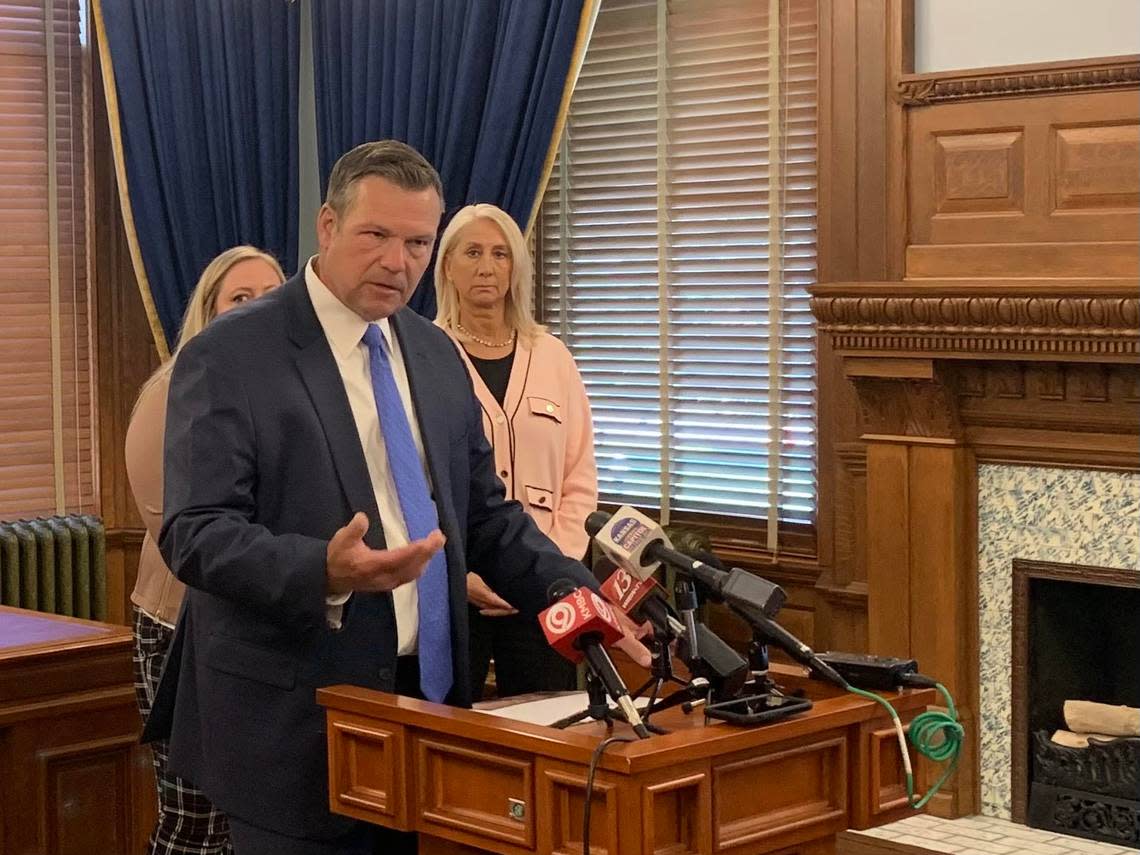Judge sides with Kobach, ruling blocks trans Kansans from changing birth certificates

- Oops!Something went wrong.Please try again later.
- Oops!Something went wrong.Please try again later.
Kansas officials will no longer need to change transgender Kansans’ birth certificates to match their gender identity after a federal ruling Thursday that voids parts of a 2019 federal order.
Judge Daniel Crabtree of the U.S. District of Kansas ruled to uphold a legal challenge from Republican Attorney General Kris Kobach, revoking part of a federal court order made four years ago that required state officials to change the gender on a birth certificate when asked.
Kobach filed the motion after the Legislature passed a sweeping law in April defining man and woman in state law based upon sex assigned at birth, in effect restricting the kinds of public spaces and services transgender and nonbinary Kansans can access.
Crabtree’s ruling did not consider whether the new law — which requires Kansas officials to issue IDs and other state documents based on an individual’s sex at birth — violates the constitution. He instead focused on the technical argument of whether the consent decree could still be followed after the new rule.
“Deciding the issue presented by the current motion doesn’t require the court to opine about SB 180’s constitutionality—a question not framed by this case’s pleadings or briefed fully by its parties,” Crabtree wrote.
A separate case concerning gender markers and driver’s licenses remains ongoing in state court.
Lambda Legal, a civil rights organization focused on LGBT issues, brought the federal case that permitted Kansans to change the gender on their birth certificate in October 2018 on behalf of four transgender Kansans. The settlement that followed the next year during Gov. Laura Kelly’s first months in office required the state to change birth certificates of trans people who sought that remedy.
In the ruling Thursday, Crabtree concluded the circumstances under which the original judgment was made had changed since Kansas’ new gender law took effect. He wrote that the law clearly only allows the state to designate a person’s gender on a birth certificate as “male or female at birth.”
“The state legislature had not spoken on this issue earlier,” Crabtree said in the order. “Now, it has.”
Omar Gonzalez-Pagan of Lambda Legal said the decision to reopen the matter and the ruling Thursday were disappointing. He added that the interpretation of Kansas law by Kobach “and his ilk” remains “as unlawful as the policies we first challenged in our lawsuit in 2018.”
“Access to accurate identity documents is vital; without accurate identity documents, transgender people face even greater threats of discrimination, harassment, and even violence,” Gonzalez-Pagan said in a statement. “We will evaluate next steps to determine how best to continue to secure the right of transgender Kansans to have identity documents consistent with who they are.”
Kobach celebrated the decision Thursday. In a statement, the attorney general said the opinion was “well reasoned and thorough.”
“As long as I am attorney general, the laws of Kansas will be enforced as written,” Kobach said. “The Legislature decided that birth certificates must reflect biological reality, and they were quite clear in how they wrote the law.”
Brianna Johnson, the communications director for Gov. Laura Kelly, said the Democratic governor will review the decision and her office’s potential next steps, indicating that there could still be legal challenges to determine if the new law violates the constitution.
“While today’s decision is disappointing, it’s not the end of the road,” Johnson said. “The state should not discriminate or encroach into Kansans’ personal lives – it’s wrong, it’s bad for business, and it’s exactly why we entered this agreement with the court years ago.”
In July, the presiding Shawnee County judge ordered that the Kansas Department of Revenue must temporarily stop processing gender marker change requests while the matter plays out in court. Earlier this month, the judge allowed for five transgender Kansans to intervene in the case despite objections of the attorney general’s office.
The law at the center of these cases, SB 180, is one of the first of its kind in the country, amid a sweep of legislation affecting the lives of transgender residents. The Republican-controlled Legislature approved the measure this spring over Kelly’s veto.

